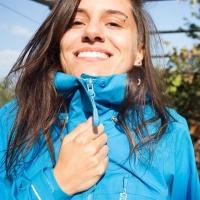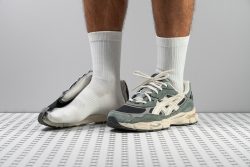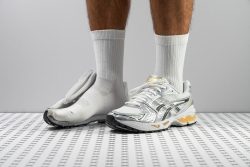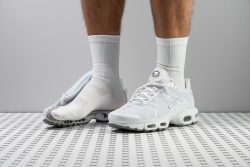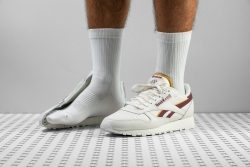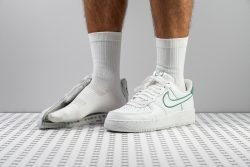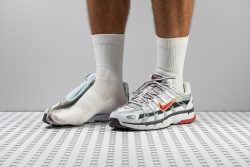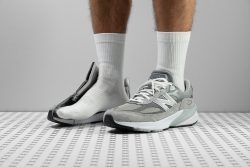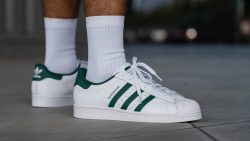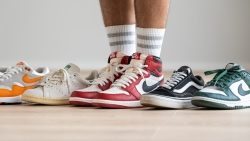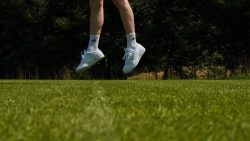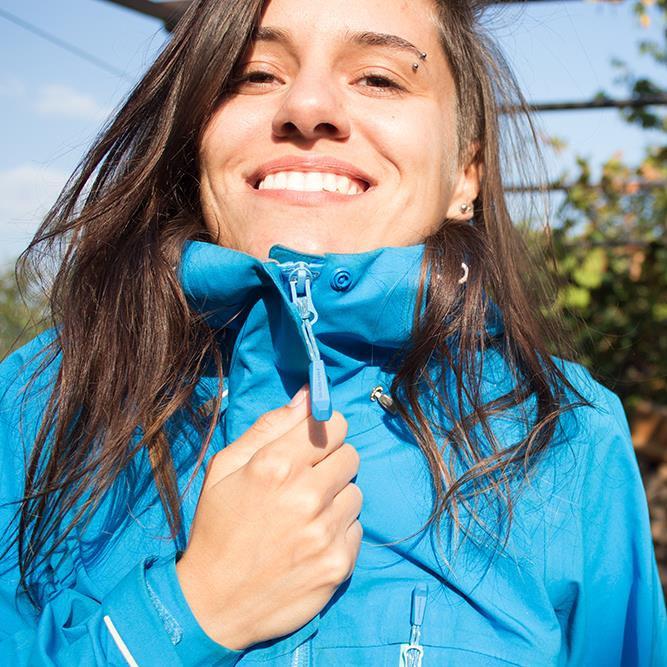7 Best Sneakers For Overpronation in 2025
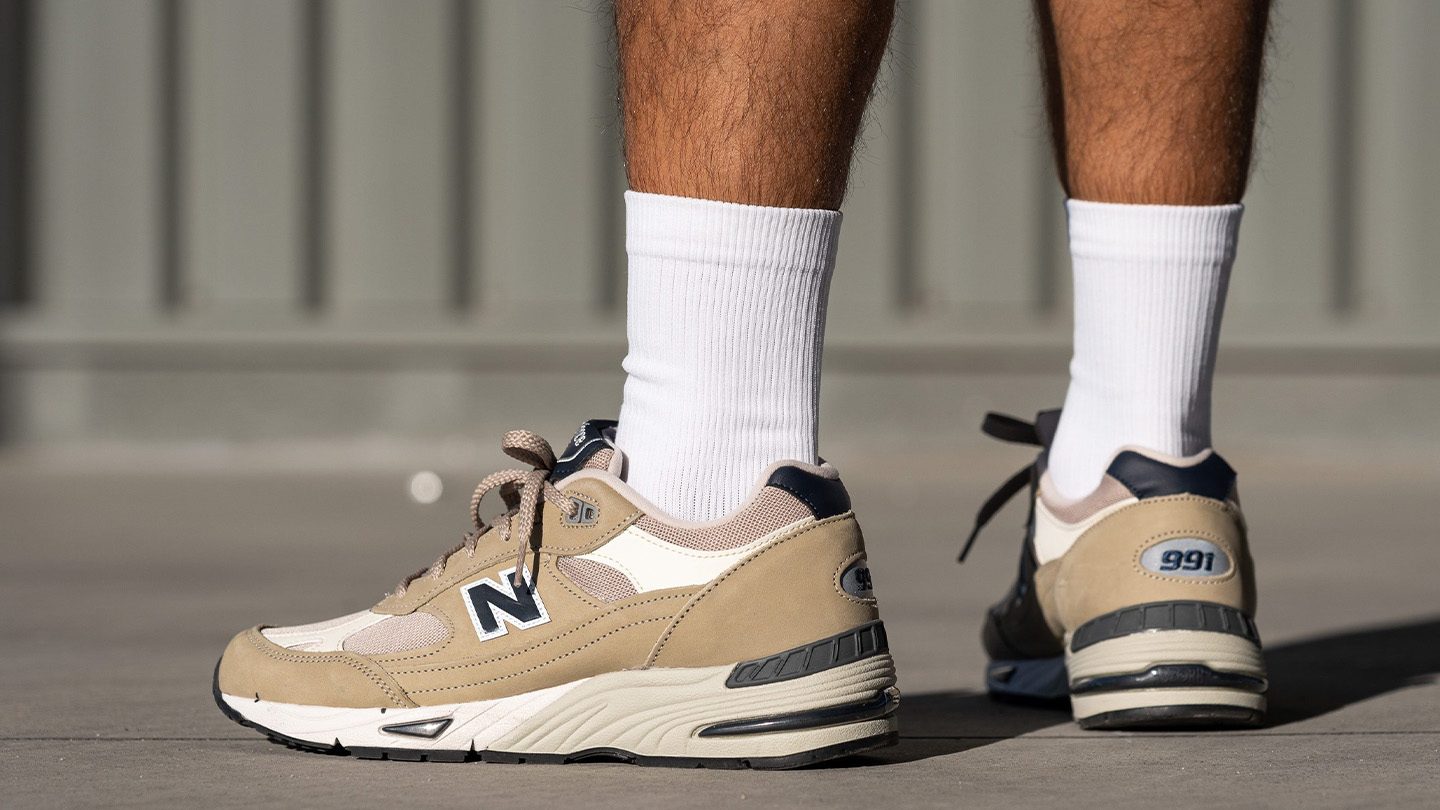
We buy shoes ourselves. We earn commissions when you buy through us, at no extra cost. Why trust us
People who overpronate need different sneaker features from those who don't overpronate. Here, we focus on those features, explain each one in great detail, and highlight sneakers that performed significantly better than the rest, both on our field and lab tests.
For those in a hurry, we put top picks in various categories under the spotlight. For those who want to learn more, we explain how we got the lab data and the details behind testing sneakers for overpronation.
How we test sneakers for overpronation
To ensure our reviews are as objective as possible, we do the following:
- We buy the sneakers with our own money. We don't have contracts or sponsorships that force us to praise the sneakers. We write everything we experience and discover, however good or bad it is.
- We wear the sneakers around town and give them a proper beating. We learn how they fit, feel, and perform over different terrain and periods of constant use.
- We test the sneakers in the lab. This means using durometers, a smoke machine, calipers, a band saw, and other tools that allow us to describe each sneaker with over 20 data points.
- We present all our findings and allow people to compare sneakers to each other and their performance to the average performance across all sneakers.
Best sneakers for overpronation overall
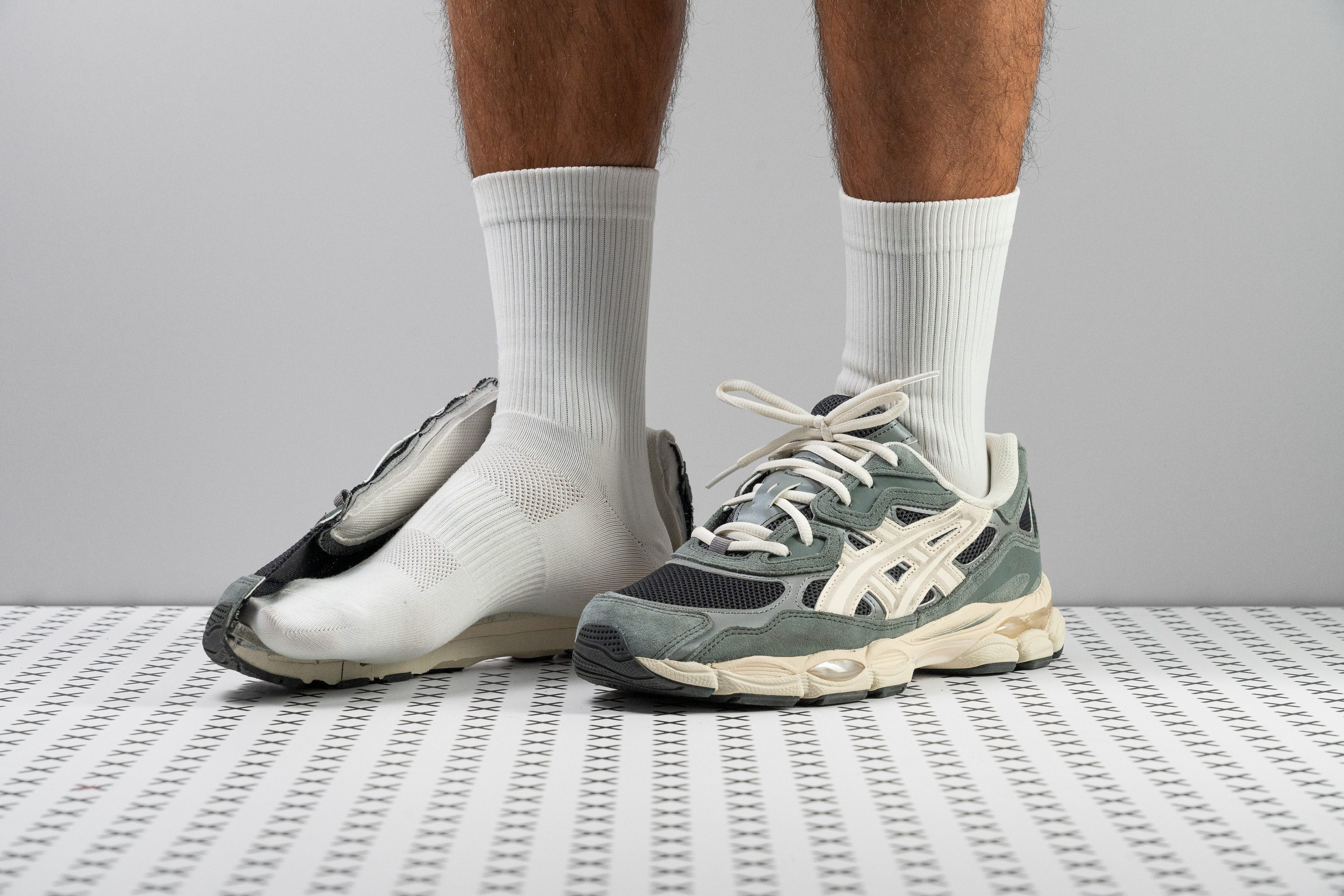
























































What makes it the best?
Based on our wear and lab tests, there’s a lot to love about the ASICS Gel NYC. It’s made of premium materials that deliver a comfortable and highly supported ride. It’s well-cushioned yet feels stable due to its wide, firm, and rigid build, making it our top sneaker for flat feet.
The chunky 34.8/24.8 mm platform ensures reliable impact protection during long hours on foot. Meanwhile, the foam measures a firm 37.0 HA per our durometer, carrying our feet without any collapsing and preventing fatigue. To boost comfort, the plush Gel technology softens each landing in the heel.
Gel NYC’s grounded support also comes from its spacious midsole. Measuring 114.6/91.6 mm, our feet had no room to lose balance. Plus, the shoe’s stiffness prevents us from moving excessively and contains our feet securely. In our manual test, we awarded it a high 4/5 torsional rigidity score.
In the upper, the shoe’s leather didn’t burn in our torch test, proving its authenticity. We also tested its breathability and gave it the highest 5/5 rating when smoke escaped out of it freely. Unfortunately, the ventilation comes at the expense of durability. We recommend switching this pair with other sneakers once in a while to extend its lifespan.
Pros
- Incredibly breathable
- Very comfortable
- Supportive and stable
- Features GEL techonology
- Fits true to size
- Feels light on foot
- Great mix of style and function
- Super trendy retro runner vibes
- Excellent grip even on wet
Cons
- Not durable
- Not for running
Sneaker for overpronation with the best breathability
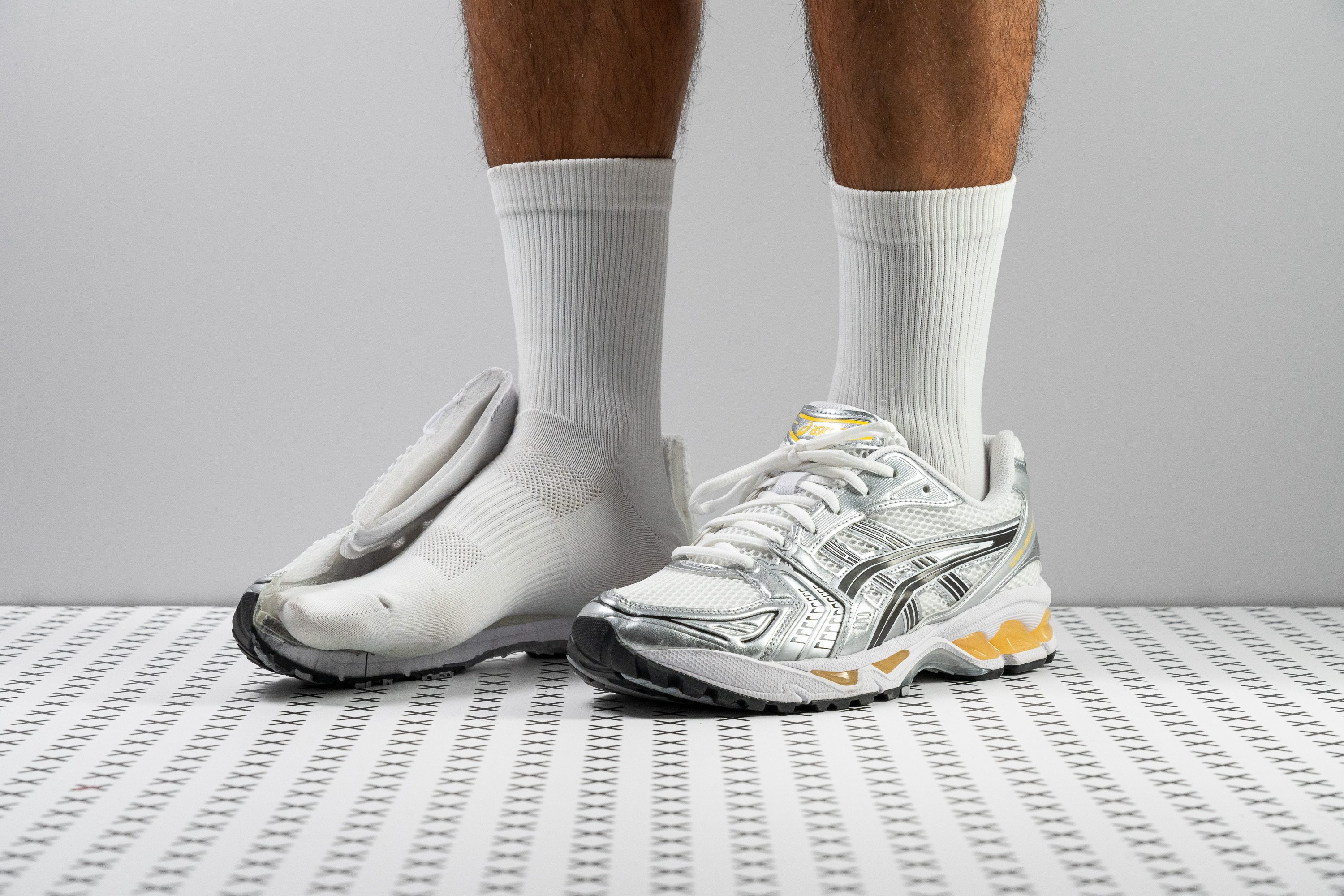






















































What makes it the best?
The ASICS Gel Kayano 14 offers all-day support and lasting comfort in our walks through its wide base and light construction. Our lab results confirm it’s airy in every sense—from its weight, flexibility, and ventilation—with the last being the most undeniable, making it our best breathable overpronation sneaker.
Under our microscope, we observed countless ventilation holes in the upper, explaining the free-flowing breeze we enjoyed. The smoke we pumped into the shoe vanished instantly, so we rated it with the maximum 5/5 breathability score. This assures us we won’t have to deal with overheating and blisters.
Its effortless ride comes from its light 12.4 oz (352g) build, 9.7% below average. It doesn’t resist our natural motions and needs only 13.4N force to reach 30 degrees, a little less than average. This boosts the sneaker’s comfort and versatility.
On the other hand, it only has little give to twisting, which enhances our stability. In our manual test, we awarded it a 4/5 torsional rigidity rating. This level of resistance will support overpronators, together with the wider-than-average 113.3/88.2 mm base that keeps us surefooted.
However, its disappointing performance in our durability tests indicates we can’t expect it to last several seasons. If longevity is a must, we recommend checking out other sneakers.
Pros
- Very stable overall
- Comfortable for all-day use
- Incredibly breathable
- Pretty lightweight
- Great lockdown feel
- Features Gel technology cushioning
- Retro-futuristic style
- Trendy Y2K vibes
- Great grip on wet and dry surfaces
Cons
- Not the most durable
- Not affordable
Sneakers for overpronation with the best support
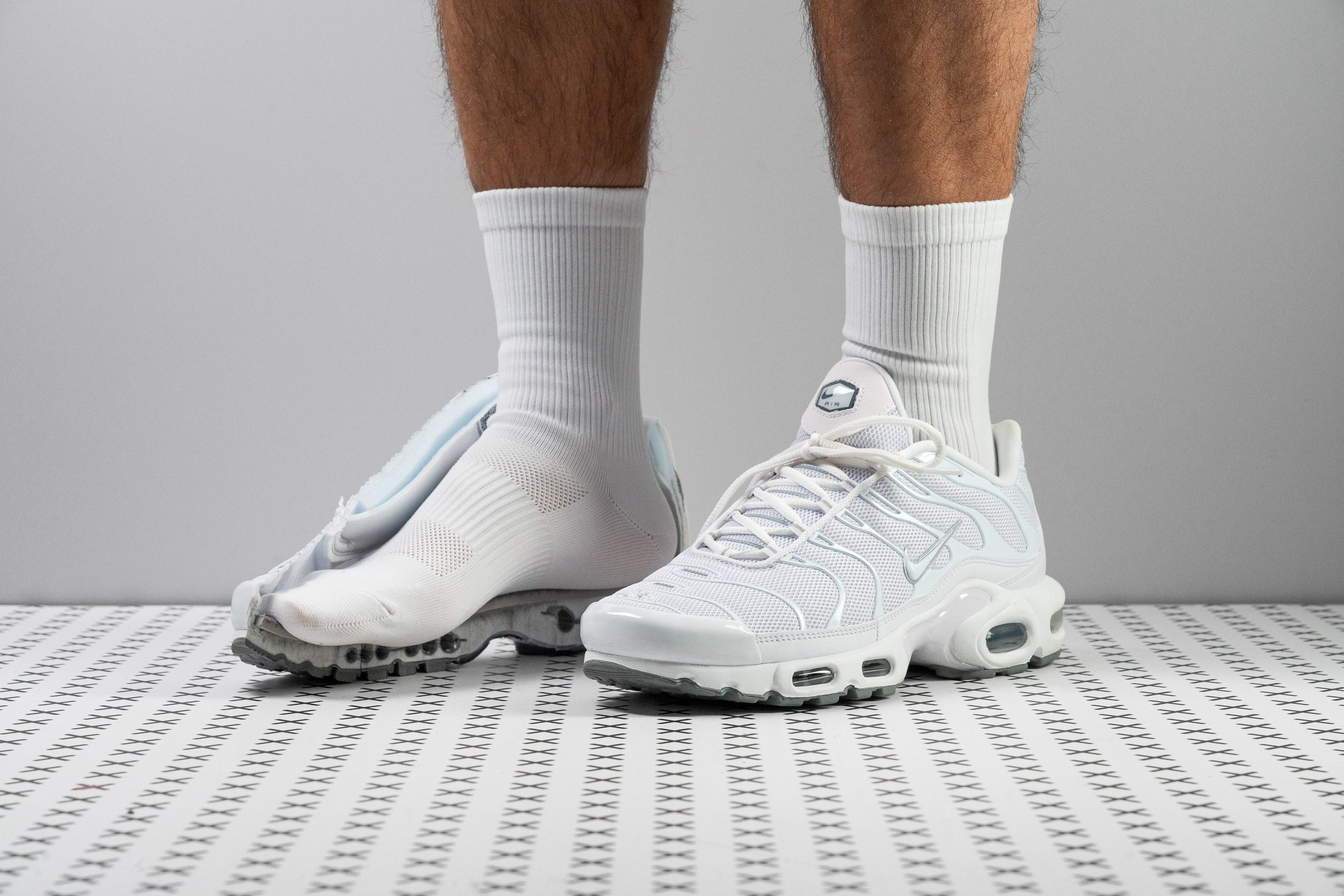








































What makes it the best?
Because of the Nike Air Max Plus’ stiff structure, excessive pronators will forget about wobbly and unsteady steps. Our lab results validate the AM Plus is relentless in terms of delivering stability, yet it does so without compromising a plush and well-cushioned experience through its Air units. Even our feet wholeheartedly agree that this sneaker offers the best support for overpronation.
While testing this shoe, we felt like it takes more effort to twist our ankles or lose balance because of its armor-like base. It has no give whatsoever, and our manual test confirms it deserves the maximum 5/5 torsional rigidity rating.
The heel counter also held us firmly and received a high 4/5 rigidity rating. Besides this, the TPU arch is another reinforcement that stabilizes the ride because it prevents our feet from collapsing.
Thankfully, all the tension and resistance are complemented by a plush midsole. Its above-average 39.8/28.1 mm stack effectively softened the impact. Meanwhile, its Air units made the 20.0 HA cushion feel softer than it is, boosting comfort for countless miles.
However, our feet got tired sooner than expected. Our scales revealed why: the shoe is a burden at 14.0 oz (398g). Sneakerheads seeking a lightweight experience should look elsewhere.
Pros
- Supreme comfort
- Lively and responsive ride
- Supportive whale tail TPU arch
- Durable outsole
- Great traction
- An incredible choice of colorways
- Reflective details
Cons
- Toebox lacks durability
- Requires a break-in period
Best classic sneakers for overpronation
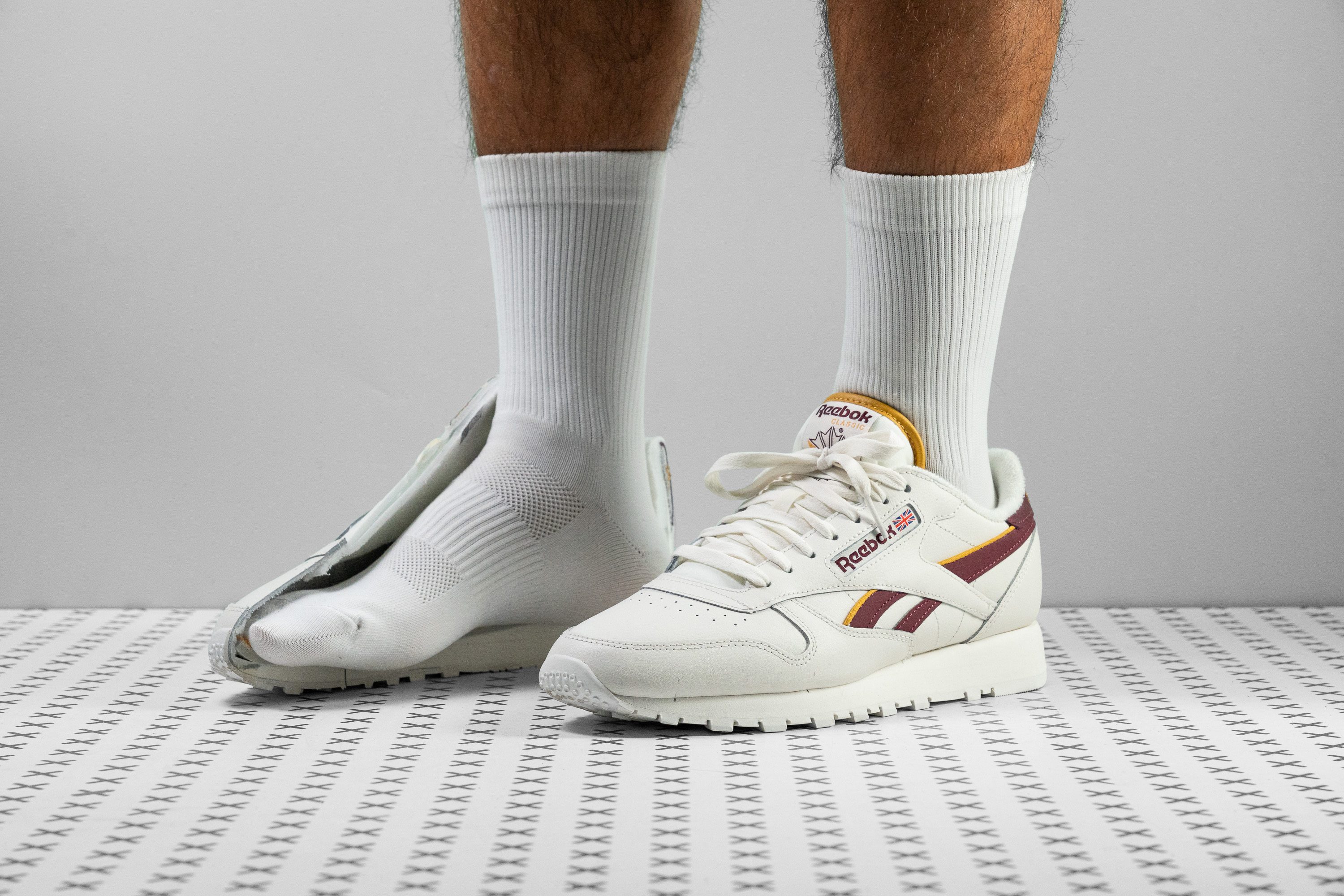







































What makes it the best?
The Reebok Classic Leather is a timeless piece with a rich heritage in running. It offers comfort through its generous stack while offering undeniable stability through its stiff structure we saw in the lab. Among the overpronation sneakers we wear-tested, this one is our best classic pick.
Its leather not only offers a clean and stylish look, it also adds rigidity to the midsole and boosts support for overpronators. It took a lot of effort for us to pinch the heel counter and twist the midsole, so we rated both with a high 4/5 stiffness score. On foot, this translates to confident and steady footing. It will also take much effort to move side to side excessively.
The cushion felt comfortable on any surface because we had lots of cushion separating us from the ground. Our caliper proves an above-average 35.7/22.1 mm stack, delivering a protective ride. Meanwhile, our durometer shows it’s a firm 35.1 HA, increasing our surefootedness. However, some sneakerheads prefer a plush sensation underfoot. If this is the case, we recommend exploring alternatives.
Pros
- Mighty plush
- Great investment
- Leader of the pack
- Supportive
- Aesthetically well-rounded
- Enduring
- Affordable
Cons
- Downgraded upper
- Dirt-magnet
Best leather sneakers for overpronation
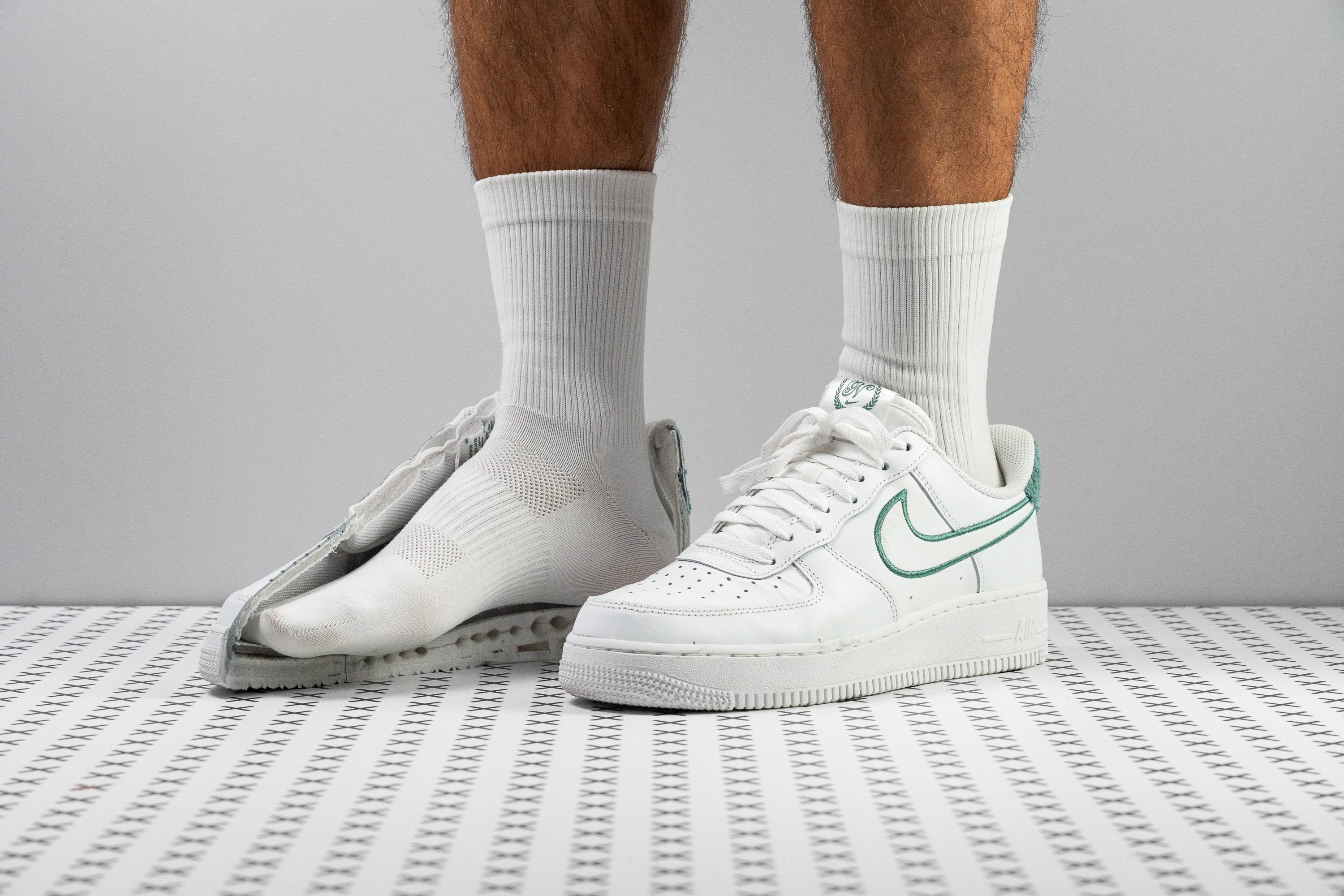
























































What makes it the best?
The Nike Air Force 1 07 LV8 feels very supportive on top and very comfortable below. Lab tests reveal it features an Air unit that dampens impact, a highly stiff structure that stabilizes our steps, and authentic leather that offers surprising breathability. Among the overpronation sneakers we tested, this AF is our top leather pick.
Using our torch and scratch awl, we tested the main panel, and it didn’t burn away, which means it’s genuine leather. While most leather shoes have no room for ventilation, we didn’t feel like overheating in this pair. Our smoke test shows that the ventilation holes in the toebox allow for some airflow, so we rated it with a 3/5 breathability.
This basketball-inspired sneaker offers a very secure ride because its stiff leather has no give to excessive movements. We had a hard time twisting the shoe and pinching the heel counter with our hands, so we immediately rated it with the highest 5/5 stiffness score. On foot, this translates to a locked-in feel.
To offset the rigid upper, the platform feels good underneath. Our durometer shows the cushion is a soft 26.5 HA, while the full-length Air unit further enhances comfort for long days of standing and walking.
We warn that LV8 has slim dimensions, especially in the toebox. Those with wide feet or who dislike a snug fit should avoid this sneaker.
Pros
- Great Air cushioning and impact protection
- Super trendy and stylish
- Fire basketball aesthetics
- Materials feel high quality
- Nice support and lockdown
- Good outsole grip
- Timeless design
- Makes you taller
Cons
- Not for wide feet
- Heavier than other Air Force 1s
- Break-in period
Sneakers for overpronation with the best shock absorption
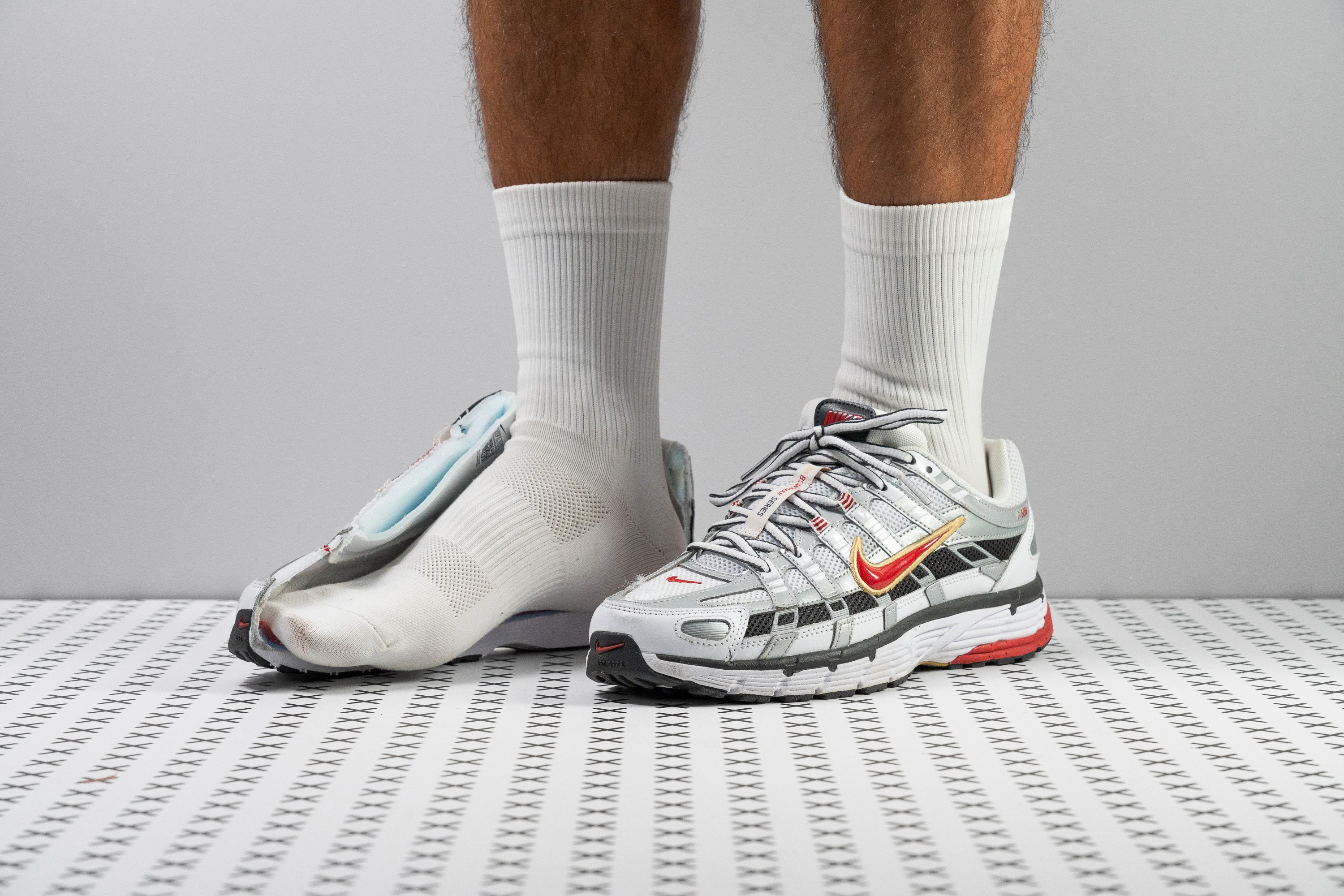




















































What makes it the best?
Our wear tests with the Nike P-6000 felt very refreshing because, other than its exceptional breathability and flexibility, it feels airy and well-cushioned on foot while offering subtle support. Among the overpronation sneakers we lab-tested, the P600 stands out as the one with the best shock absorption.
The P-6000 was a joy to wear all day because of its exceptional impact protection. Our lab test shows a high 111 SA result, offering a significant 27.6% better shock absorption than average.
Weighing only 10.3 oz (292g), we immediately recognized its unassuming persona, and our scales confirm it’s 25.1% lighter than average. Its flexible construction elevates its featherlight feel, emerging 40.6% more bendable than average in our lab test.
To prevent too many unnecessary movements, we’re held firmly by the stiff heel counter, which rated a 4/5 in our stiffness assessment. The 109.0/84.4 mm base also runs slightly wider than average, allowing us to enjoy a well-planted footing.
The breathable upper wraps up the overall easy breezy experience. It kept our feet fresh by offering maximum ventilation, demonstrated by its perfect score in our smoke test.
However, the cushion feels plush, which may require more effort to remain stable. Those who want more straightforward stability should find a shoe with a firmer base.
Pros
- Incredibly comfortable for all day wear
- Amazingly lightweight yet padded
- Soft and flexible yet slightly bouncy ride
- Trendiest Y2K vibes
- Great for summer
- Compliment magnet in any colorway
- Affordable
Cons
- Not the best for winter
- No midsole technologies
Best dad shoes for overpronation
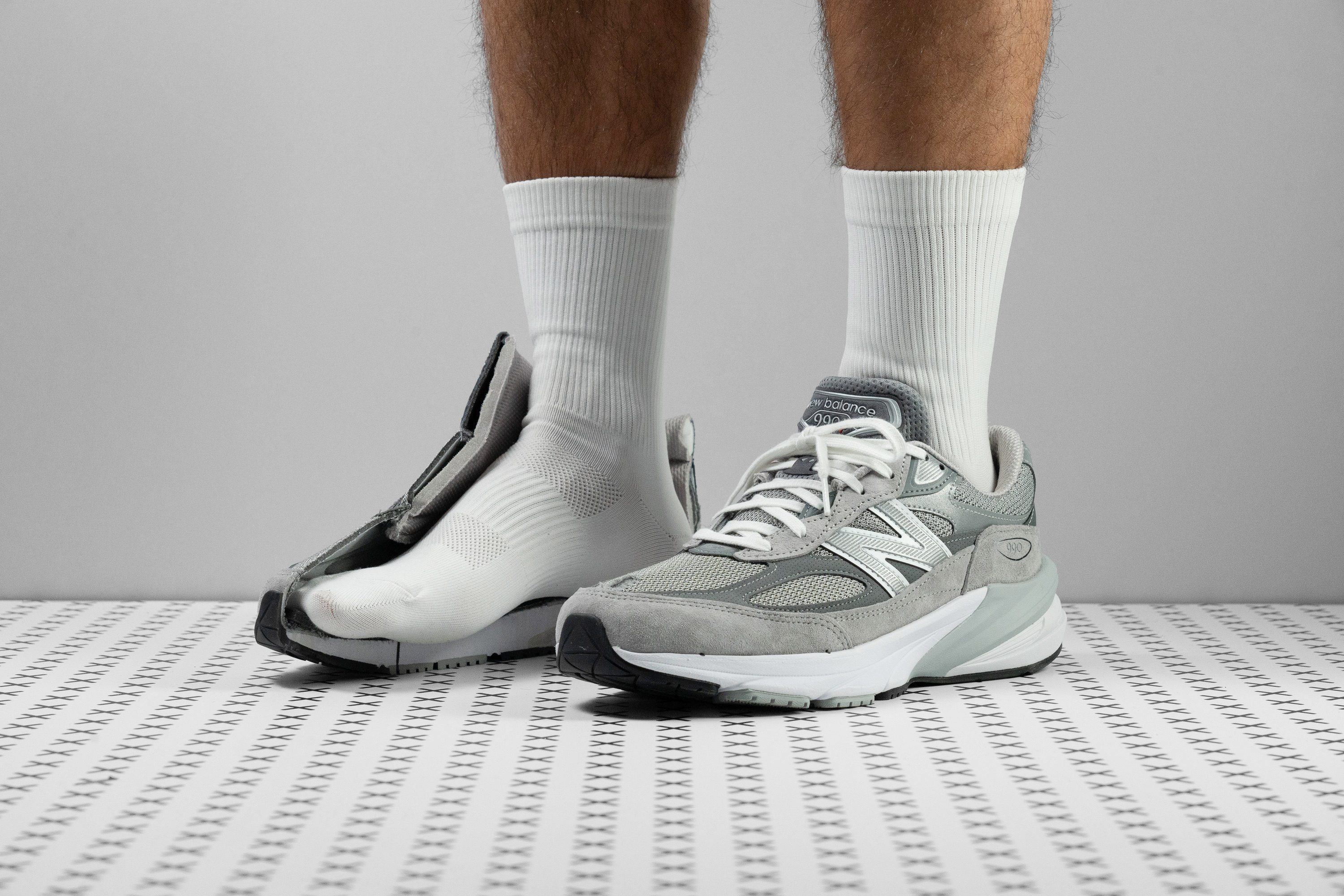





















































What makes it the best?
After testing out the New Balance 990 v6 on foot and in the lab, we believe overpronators seeking a dad shoe have this sneaker as a top contender. Its stylish retro look is complemented by the kind of support that boosts our confidence, while its outsole’s performance in our durability tests assures us it will last long.
This sneaker features ENCAP, which is a technology found in stability running shoes in the past. It creates a stable platform for us to land safely and transition smoothly to the next step. It also adds structure to the shoe, evidenced by its high 5/5 torsional rigidity score in our manual assessment.
The awesome blend of arch support and impact protection that the 990 v6 offers allowed us to wander mindlessly in the city. At 39.1/23.8 mm, the stack is chunky and protects us from the surface. With its superior shock absorption of 102 SA, it reduces the stress of impact on our joints.
We also measured the Ndurance rubber’s hardness at 89.0 HC, which only received a minimal 1.0 mm dent in our Dremel test, indicating it can handle daily wear.
Unfortunately, the case is not the same for the upper. It surrendered immediately to our Dremel, so those who need more reinforcements in this area should try another pair.
Pros
- Unexpectedly lighter than average
- Real suede and quality materials
- Extra thick cushioning for all-day wear
- Mind-blowing arch support and stability
- Exceptionally hard-wearing outsole
- Fantastic breathability
- Well-padded all around
- Six(!) widths available
Cons
- Very delicate toebox mesh
- A bit stiff
Overpronation symptoms and causes
Overpronation is so common that over 50% of people overpronate to some degree, while many estimate that number is much higher, over 70%. You should not be worried if you overpronate, but if you’re experiencing discomfort or pain, we recommend seeing a specialist first and not looking for footwear that will fix your problems.
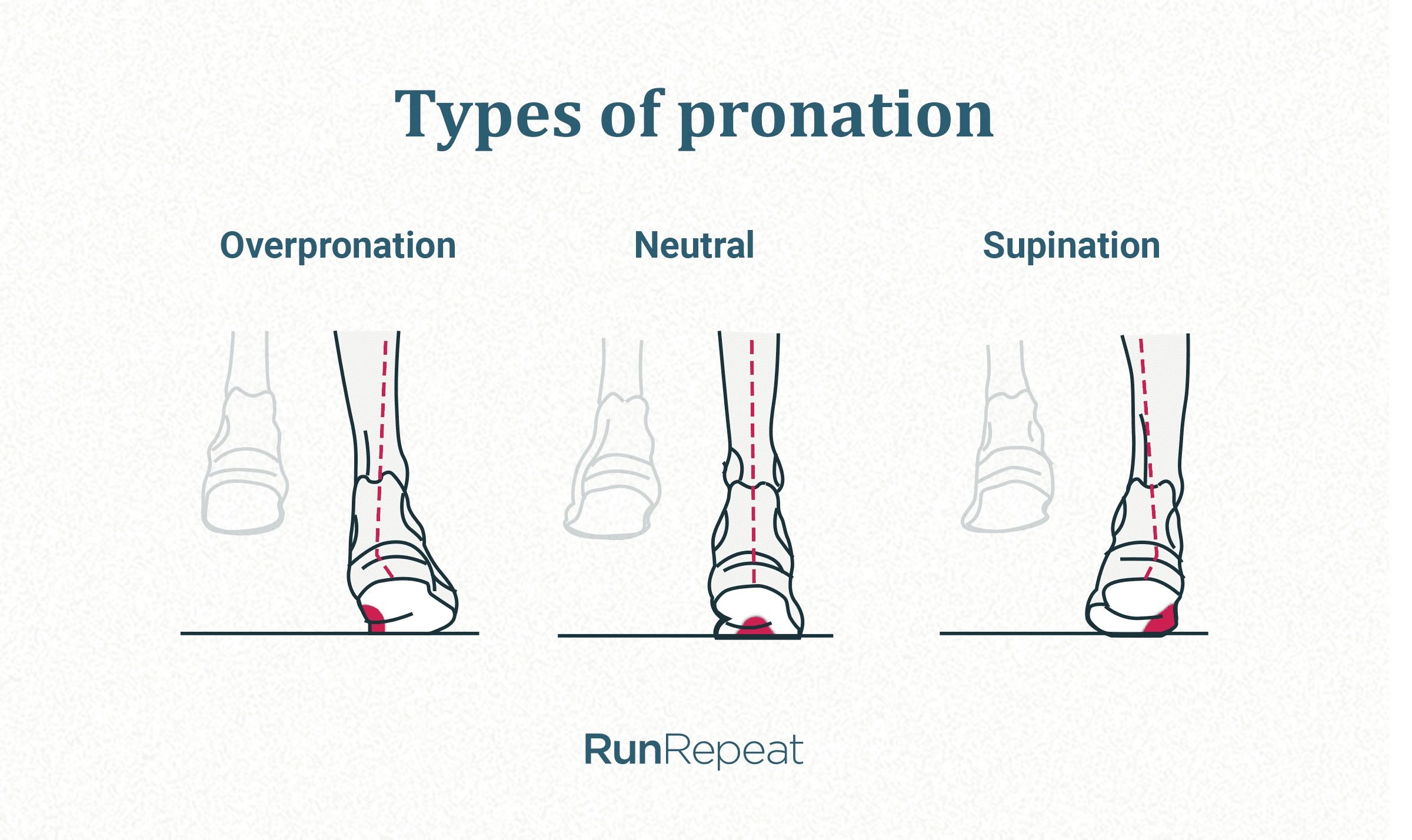
Overpronation happens when your arches flatten too much at the landing and the ankles roll inward. People who overpronate use the medial (inner) side of the sneakers more because of that rolling inward. Unlike them, supinators use the lateral (outer) side of the shoe more.
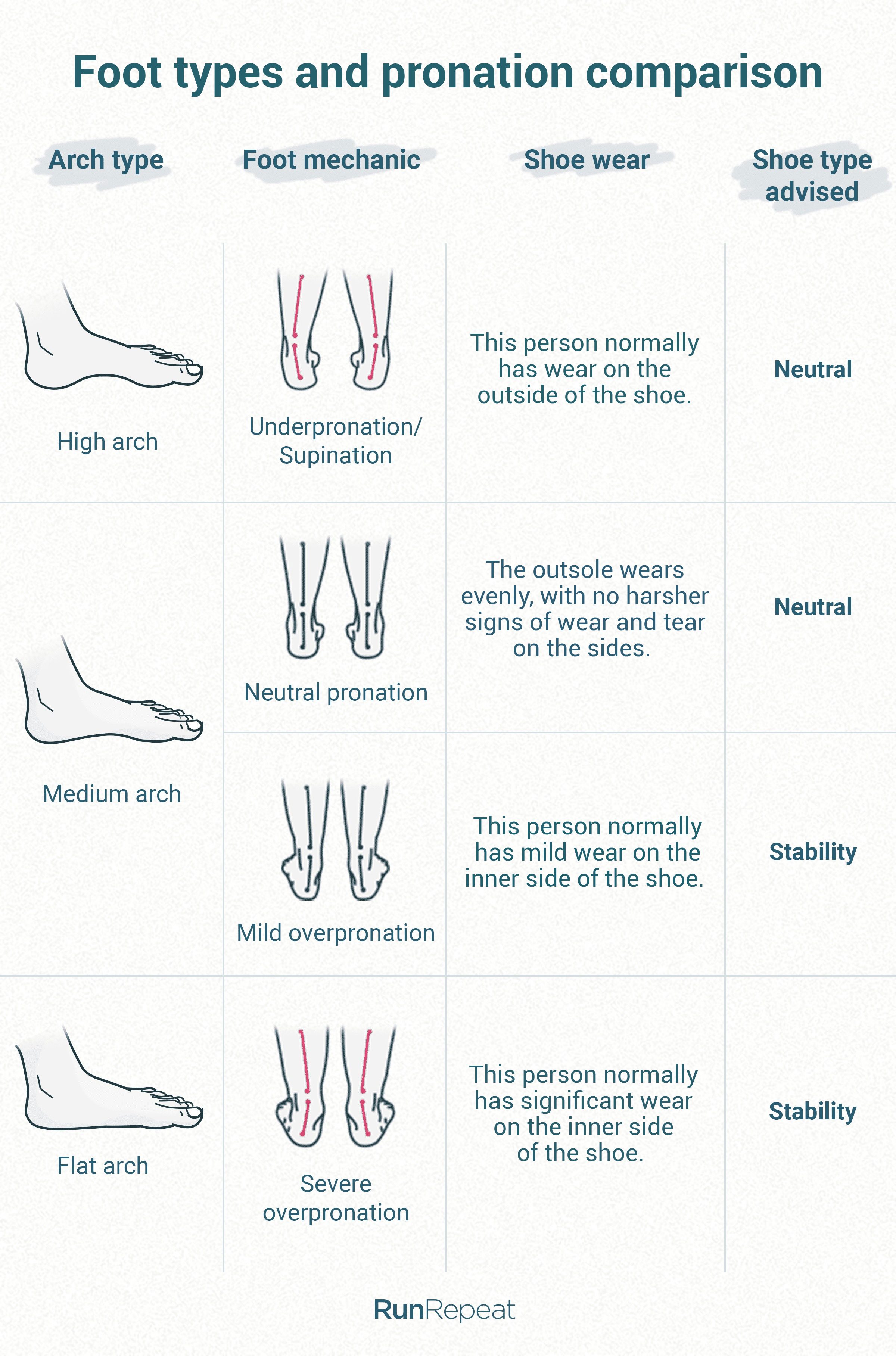
Neutral pronation means that people land at the center of the heel and transfer the weight toward the ball of the foot, also at the center of the shoe. Sticking to the lengthwise center of the shoe and no wobbling to the sides.
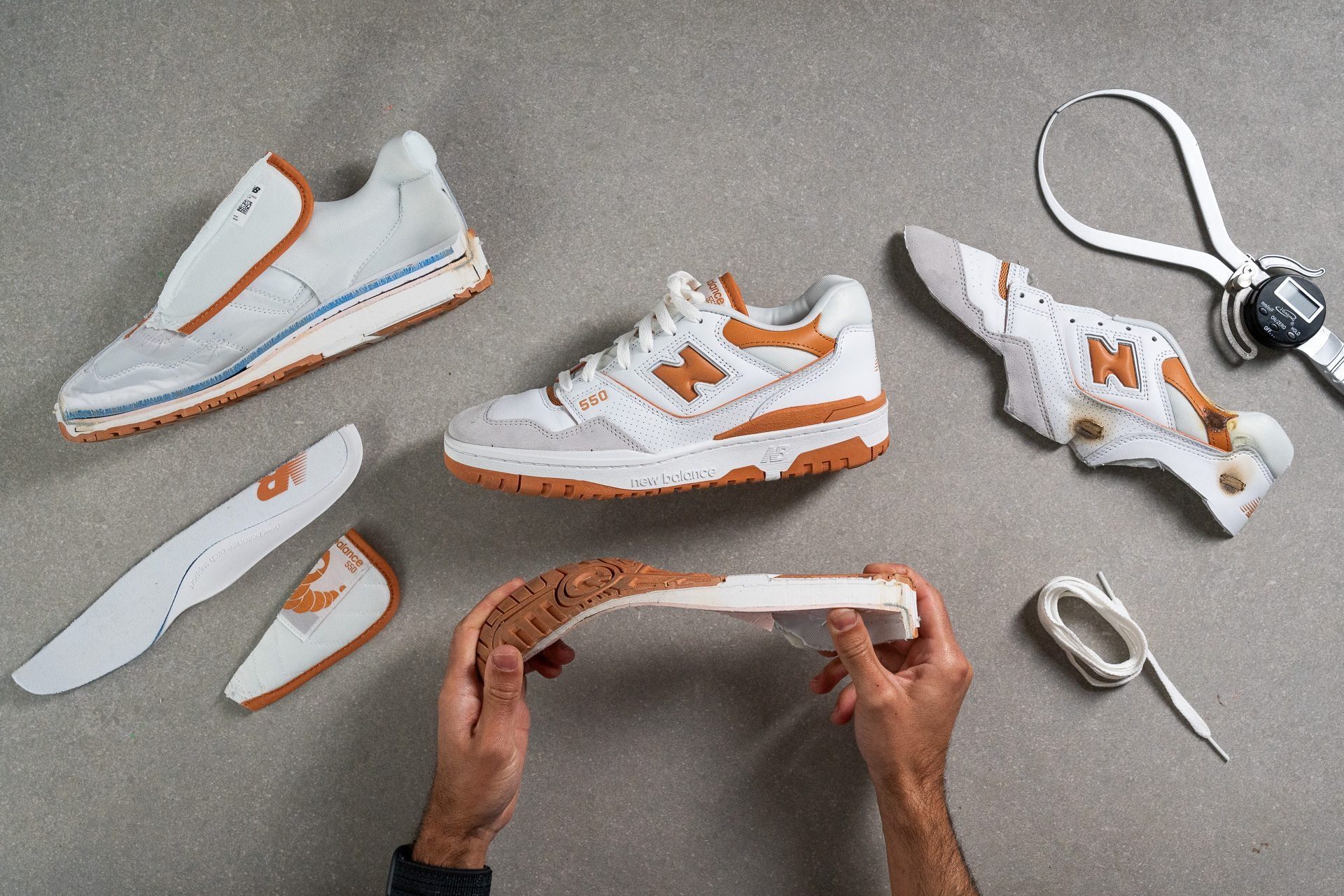
Overpronation can happen for different reasons. It may develop even later in life, if you had an injury or some compensation started happening. Because of this, we strongly recommend seeing a podiatrist or a PT if you’re not sure about your pronation or you’re experiencing changes in your gait.
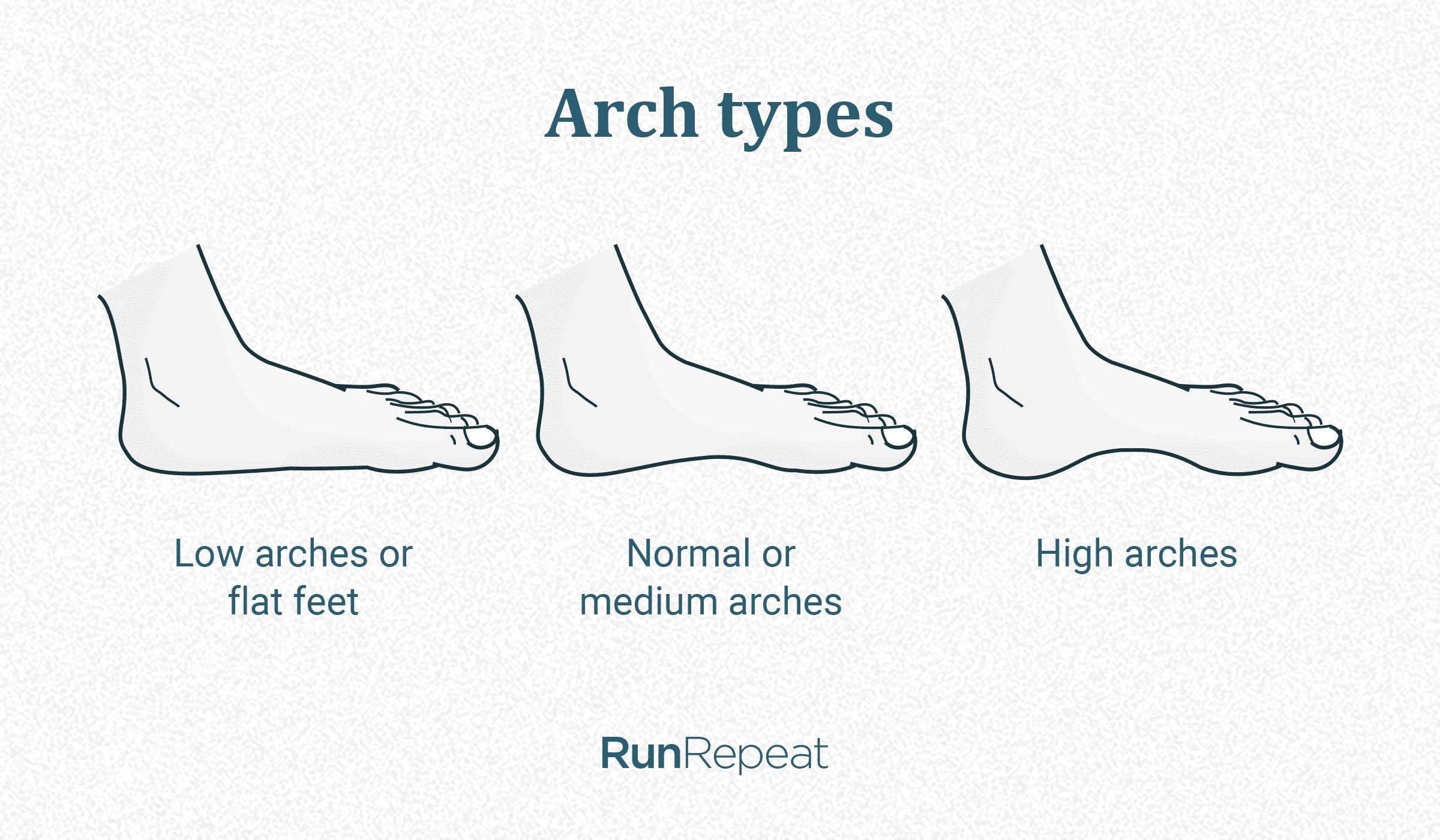
People who overpronate often have flat feet. It’s good to know how high your arches are because, in many reviews, we focus specifically on this: whether a sneaker is good for flat or high arches. Low arches tend to need more supportive shoes, which goes along with all the features found in sneakers for overpronation.
6 sneaker features to look for if you overpronate
Because of the difference in these movements, sneakers for overpronators are different from those that have neutral pronation and underpronation.
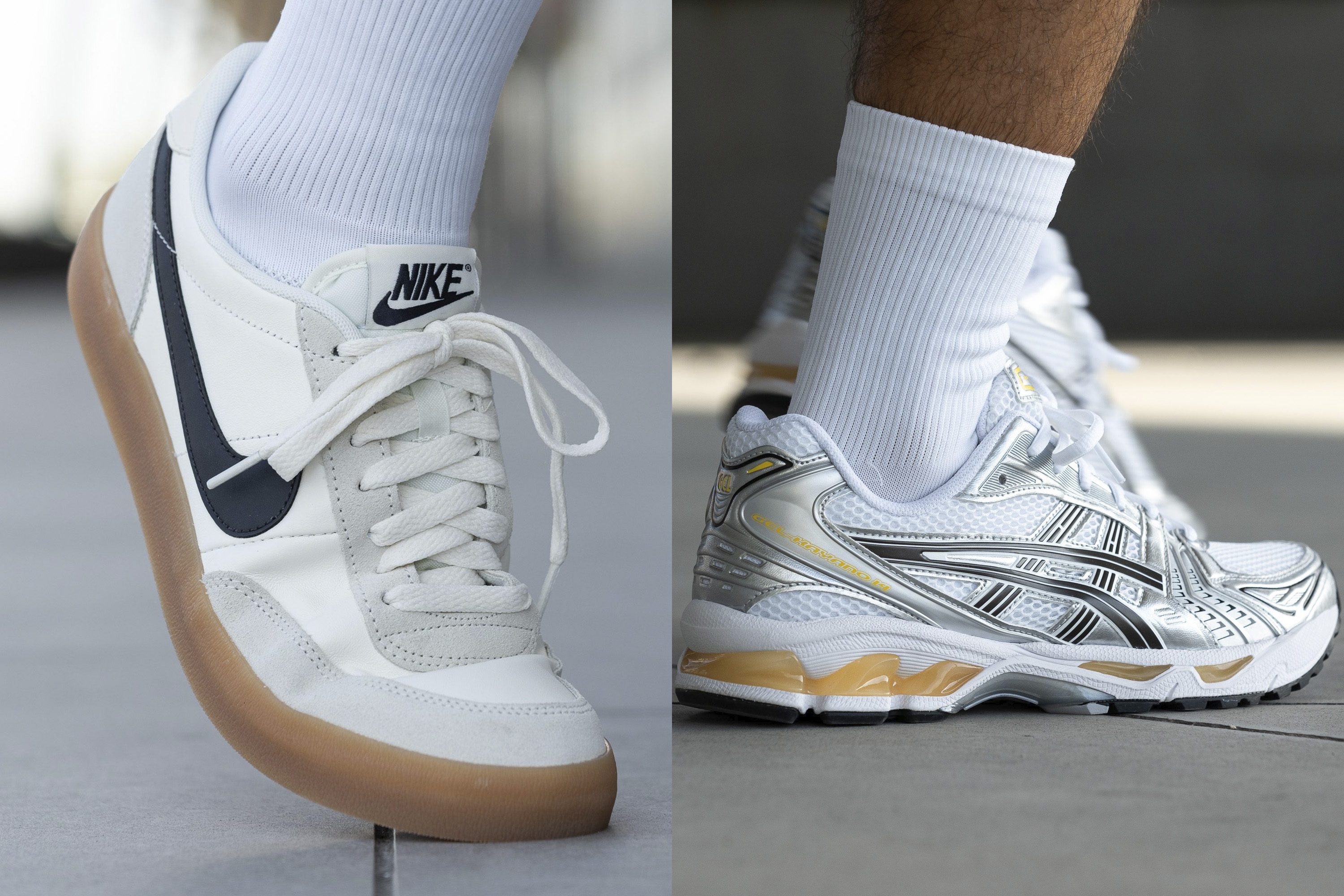
Based on our field tests and lab tests, we recommend looking for (some of) these features if you’re overpronating:
- Wide base because the wider it is, the more stable the ride. Tall and narrow bases are a big no.
- Rigid base, specifically torsionally rigid. This means that the sneakers are difficult to twist.
- Firmer midsoles or dual-density midsoles were a must until recently and some sneakers still feature them. What surprised us were shoes that have soft midsoles and, in their case, the stiffness of the platform and heel counter made up for the softness not just with no issues, but they brought stability to a whole new level.
- Heel counters that are stiff. Stiff heel counters stabilize the heel and they are usually padded which feels great as it contributes to the overall lockdown.
- Uppers that are not flimsy but supportive.
- Sidewalls. Sidewalls are midsole extensions that climb up the upper to make the sneaker more stable. In sneakers, they are often made of a material different from the midsole.
Look for wide platforms if you’re an overpronator
Choose sneakers with wider rather than narrower platforms. The differences can be wild and, if you don’t trust us, just look at the example below.
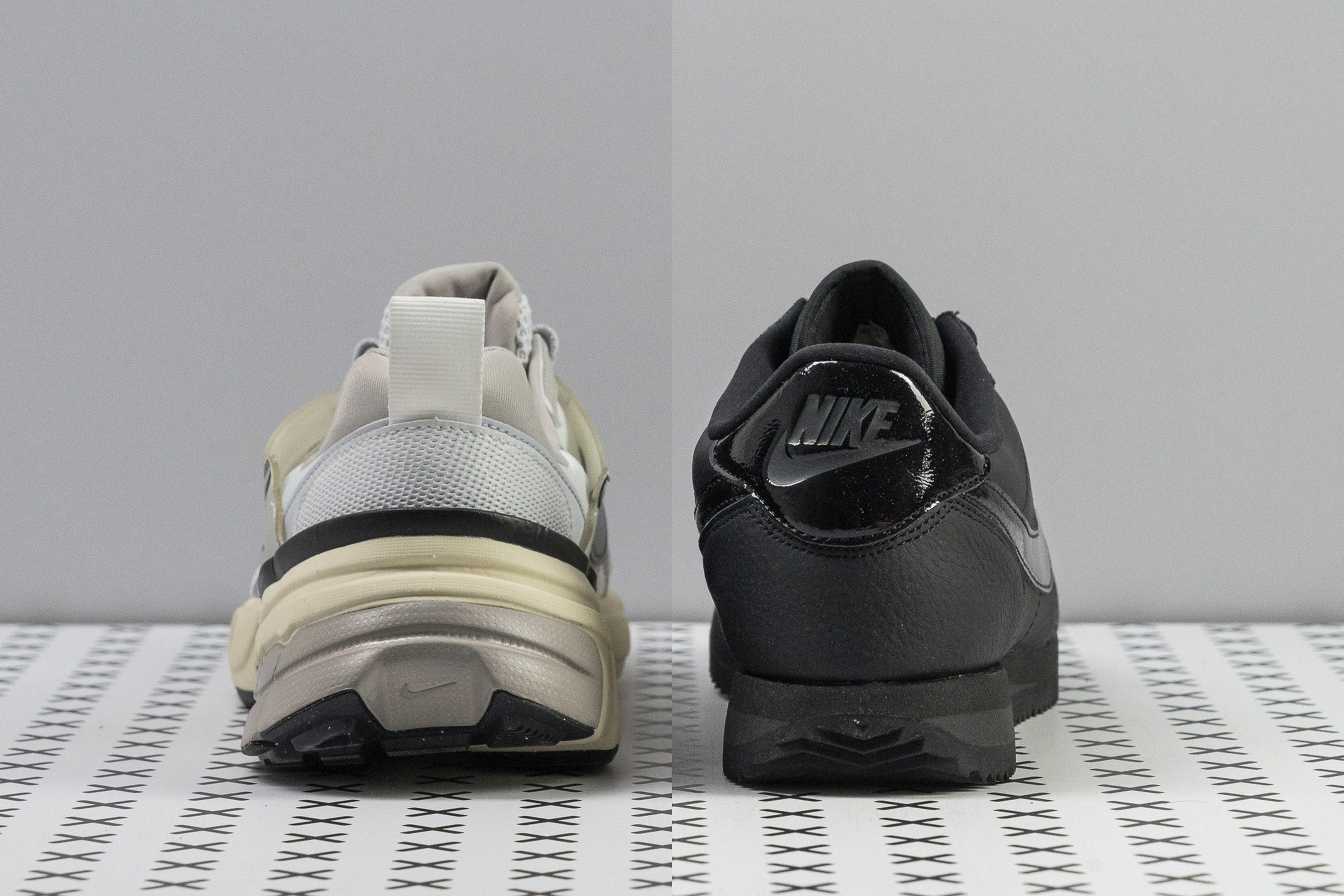
Wider midsoles make the sneakers more stable and this is a priority for overpronators. We want to eliminate any unnecessary movement that comes from instability!
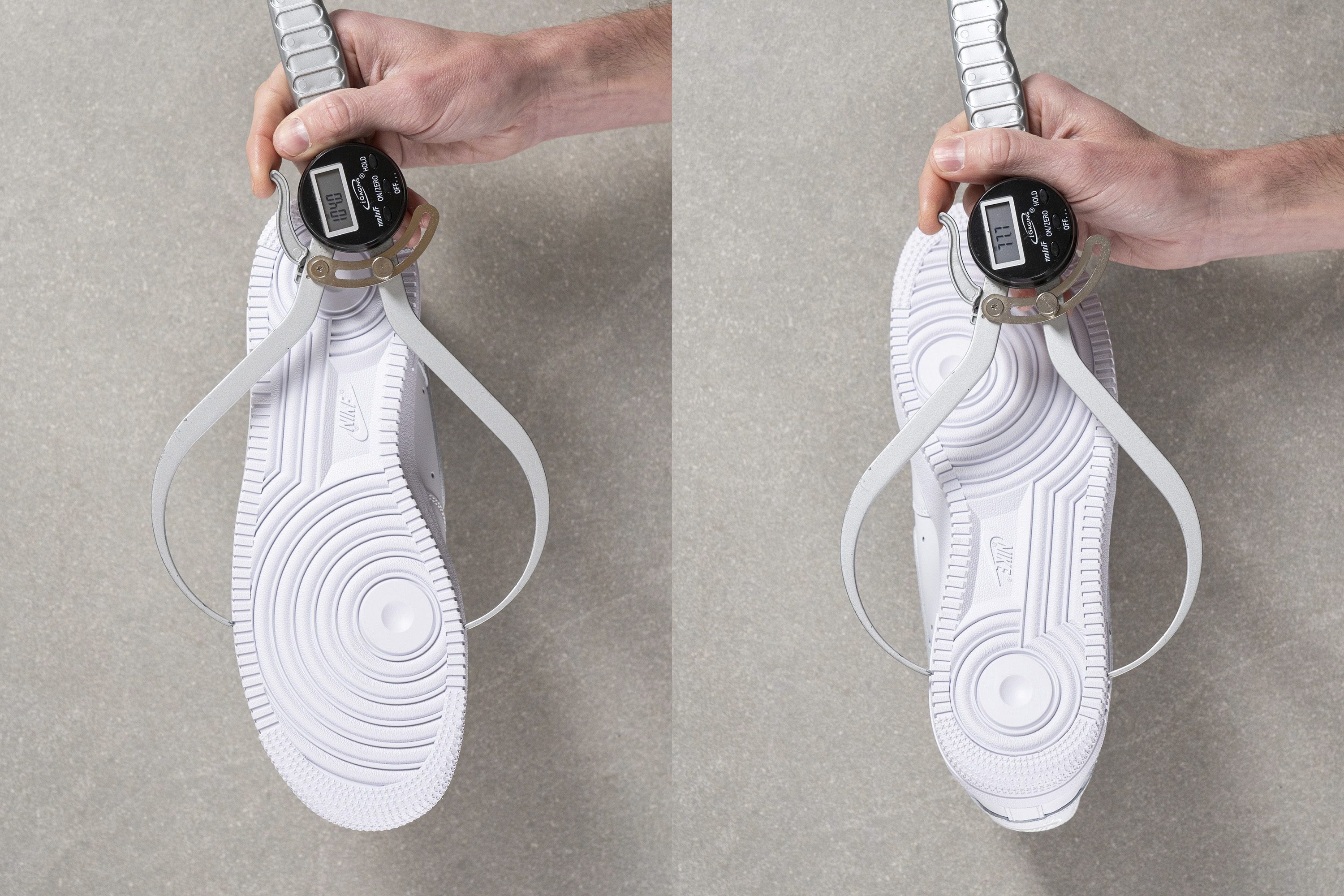
Here’s how wide the platforms are in top-rated sneakers for overpronation:
And here are the widest platforms we ever measured in sneakers for overpronators:
Why rigid base is a priority
When you take a sneaker into your hands, you can try to test its longitudinal stiffness by trying to bend it. You can also test its torsional rigidity by trying to twist it. When it comes to overpronation, we care about the later.
When we twist the sneakers, we assess their torsional rigidity. This one scored the highest, 5/5, making it very rigid
Torsionally rigid platforms bring a high level of stability to the sneakers. This stability is super important for overpronators who tend to use the sneakers unevenly, by putting more weight on the inner side. Small imbalances can happen and then feet muscles have to work more. To prevent this, we look for rigid midsoles.
This sneaker scored the lowest on our torsional rigidity test, 1/5 making it very flexible
You may wonder why it’s the twisting we care about and not the bending. We do so because when ankles collapse inward, feet tend to use the inner side of the sneaker more. This movement happens from the center of the sneaker towards the sides. Torsional rigidity makes the platform stiff in this direction!
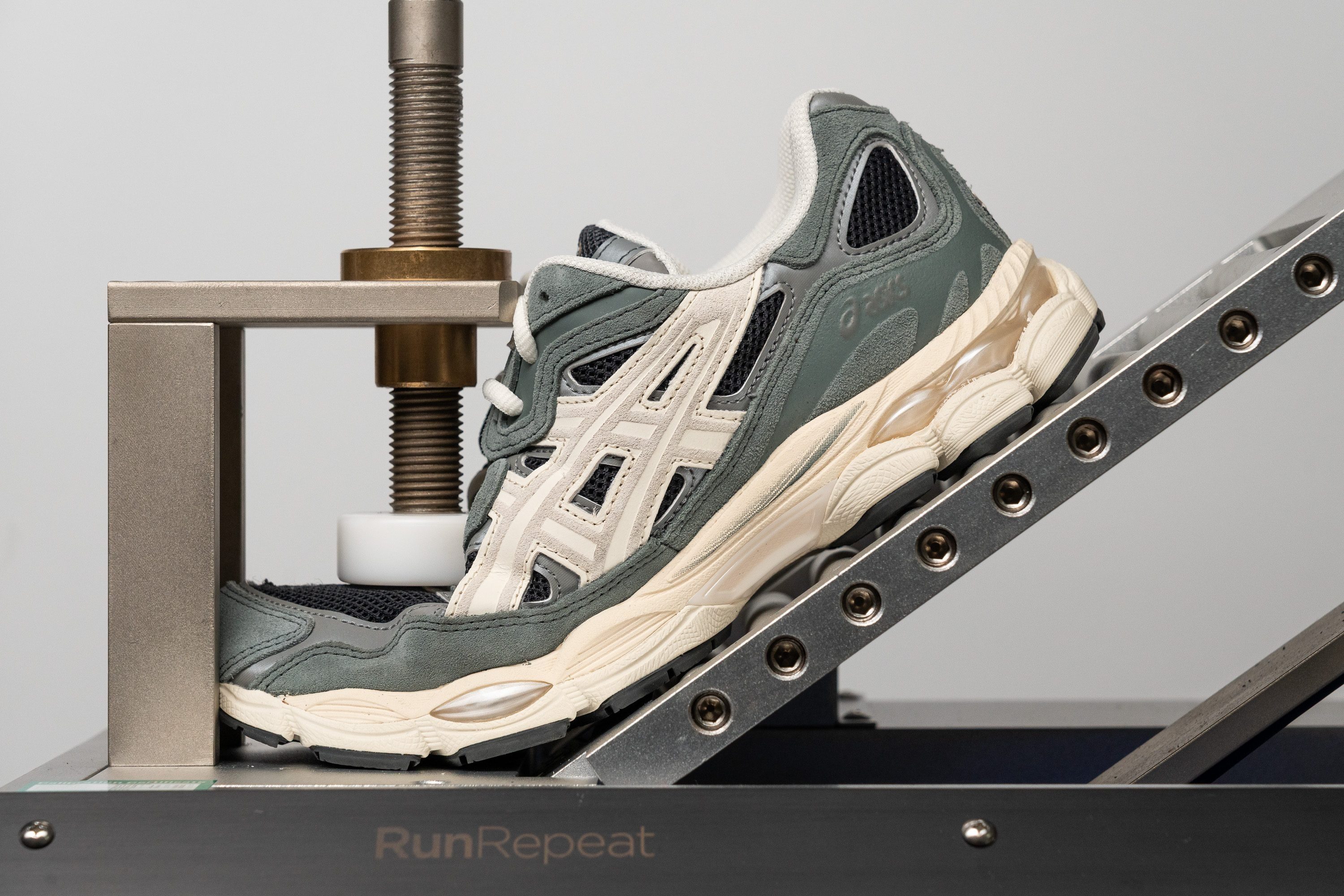
When we talk about longitudinal stiffness, the more flexible the sneaker is, the more natural it feels. Our feet bend as we walk barefoot and some people prefer a similar feeling in sneakers as well. They should look for very flexible platforms. On the other hand, we have longitudinally stiff sneakers as well, so it’s a matter of personal preference.
This criteria excludes the possibility of a minimalist sneaker qualifying as a sneaker for overpronation. Minimalist footwear is very flexible (in all directions), low to the ground, and usually not supportive at all.
How the softness of footwear for overpronation has changed over time
Some time ago, we’d say you should look for firmer midsoles or dual-density midsoles. The logic was simple: softer midsoles are squishy and, while they allow you to sink in, which is perceived as comfort, they also allow your feet to wobble left and right. So, firmer midsoles were a good choice.
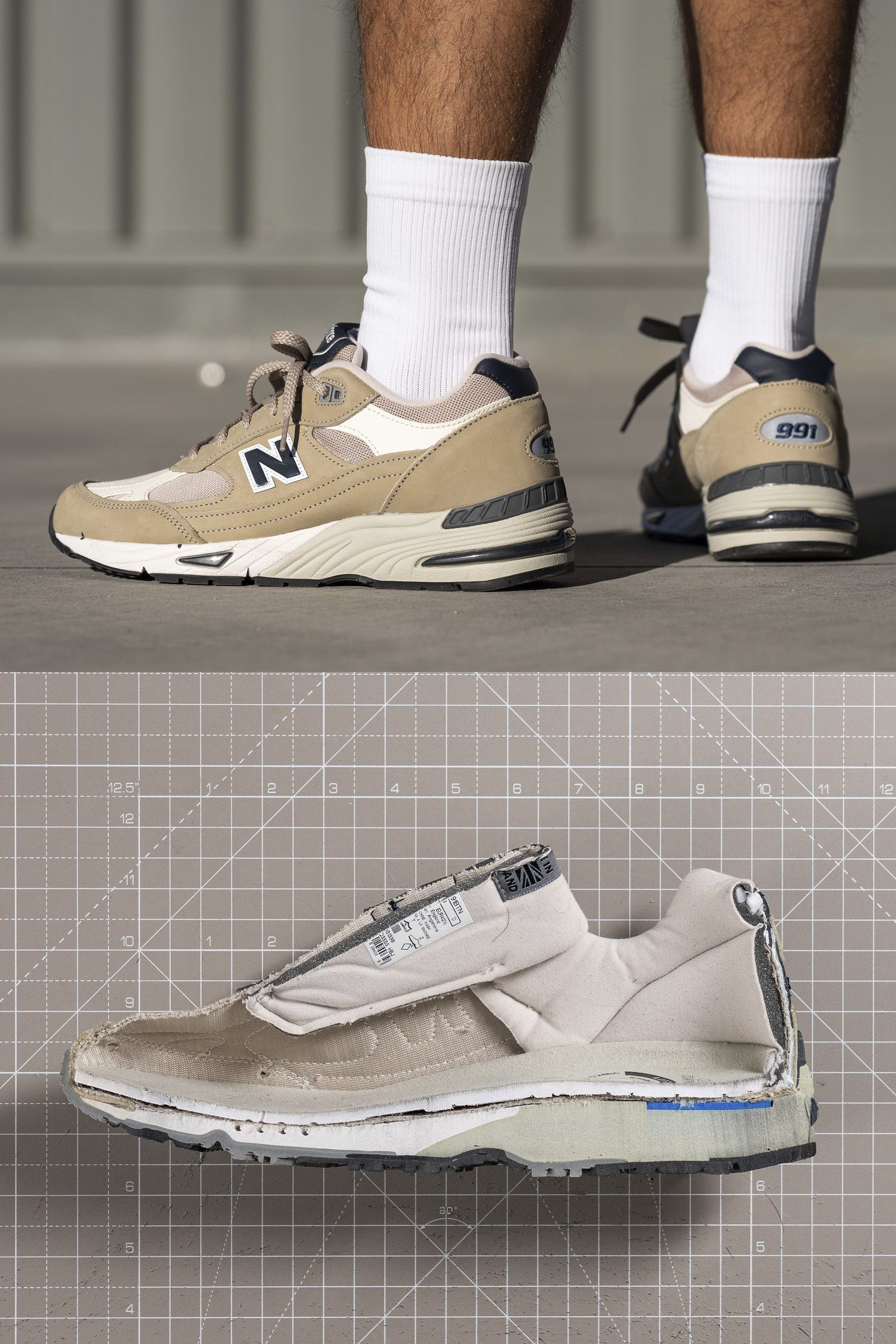
We also had and still have midsoles made of 2 different foams. Previously, the focus was on putting the firmer foam under the arch or on the inner side of the shoe, so that it provides support where you need it the most when you’re overpronating. This has been changing, so we have dual-density midsoles that are focused on forefoot/heel and not the inner/outer side of the sneaker.
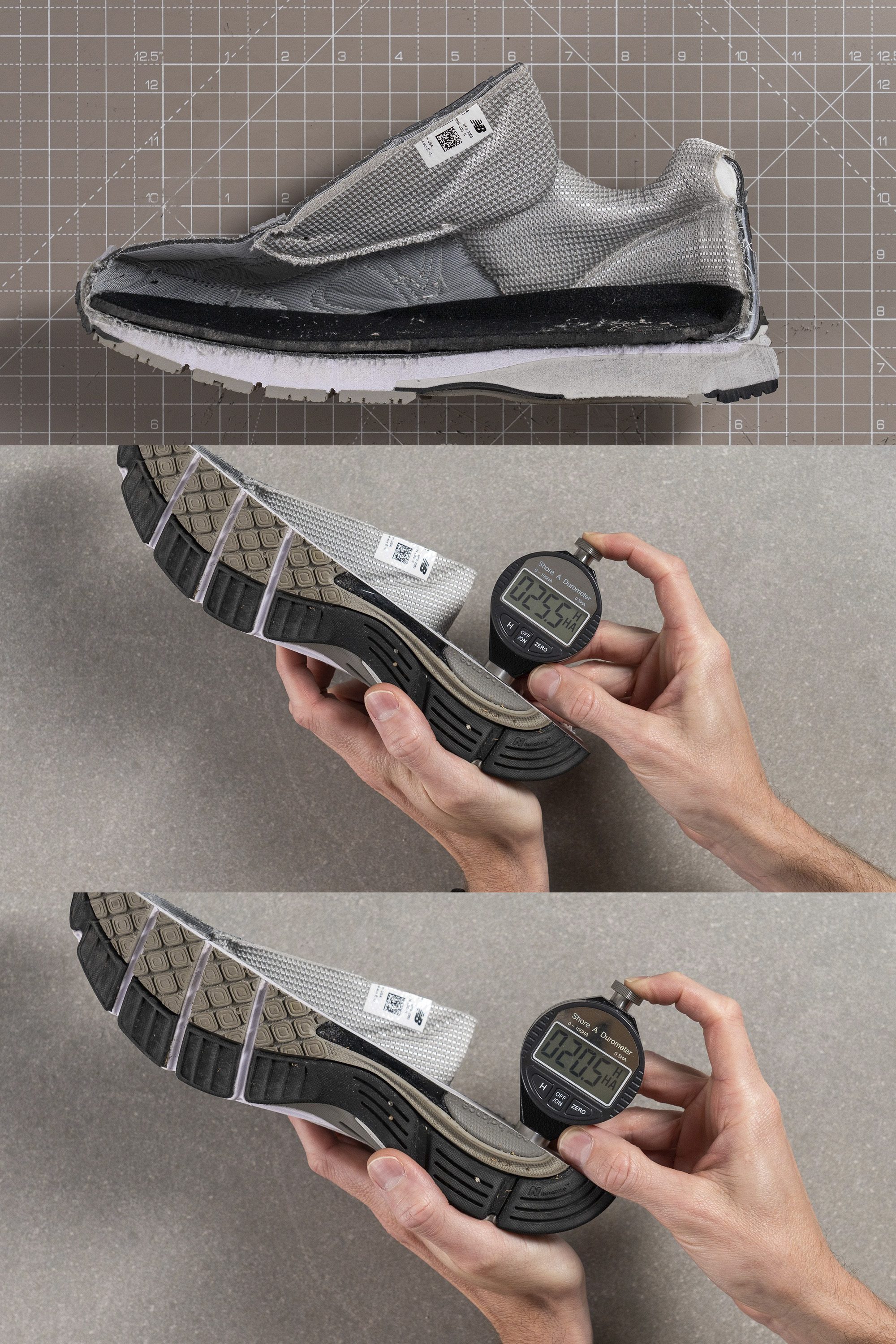
Today, we’re seeing softer shoes that are good for overpronators. This means that the torsional rigidity of the platform and the stiffness of the heel counter are given a much higher value for overpronators.
That does not mean that the firmer midsoles are bad for you; it just means that you should not disregard a sneaker if it has a softer footbed. Other features may be great for you.
Shock absorption of sneakers for overpronation
Softness is only one piece of this midsole puzzle. While it's something many rush to when thinking about comfort, performance-wise, we should also talk about shock absorption. Shock absorption or shock attenuation is the midsole's ability to dampen the impact at the landing. Every time you hit the ground by landing on the heel, it's the midsole's job to deal with as many impact forces as possible.
Testing the shock absorption of sneakers for overpronation in RunRepeat lab
When the midsole is bad at this, the legs have to deal with much more stress. This is what we recommend avoiding and, in order to do so, best to look for sneakers with a shock absorption of at least 80 SA (this is considered moderate shock absorption, and above 105 SA it's considered high shock absorption).
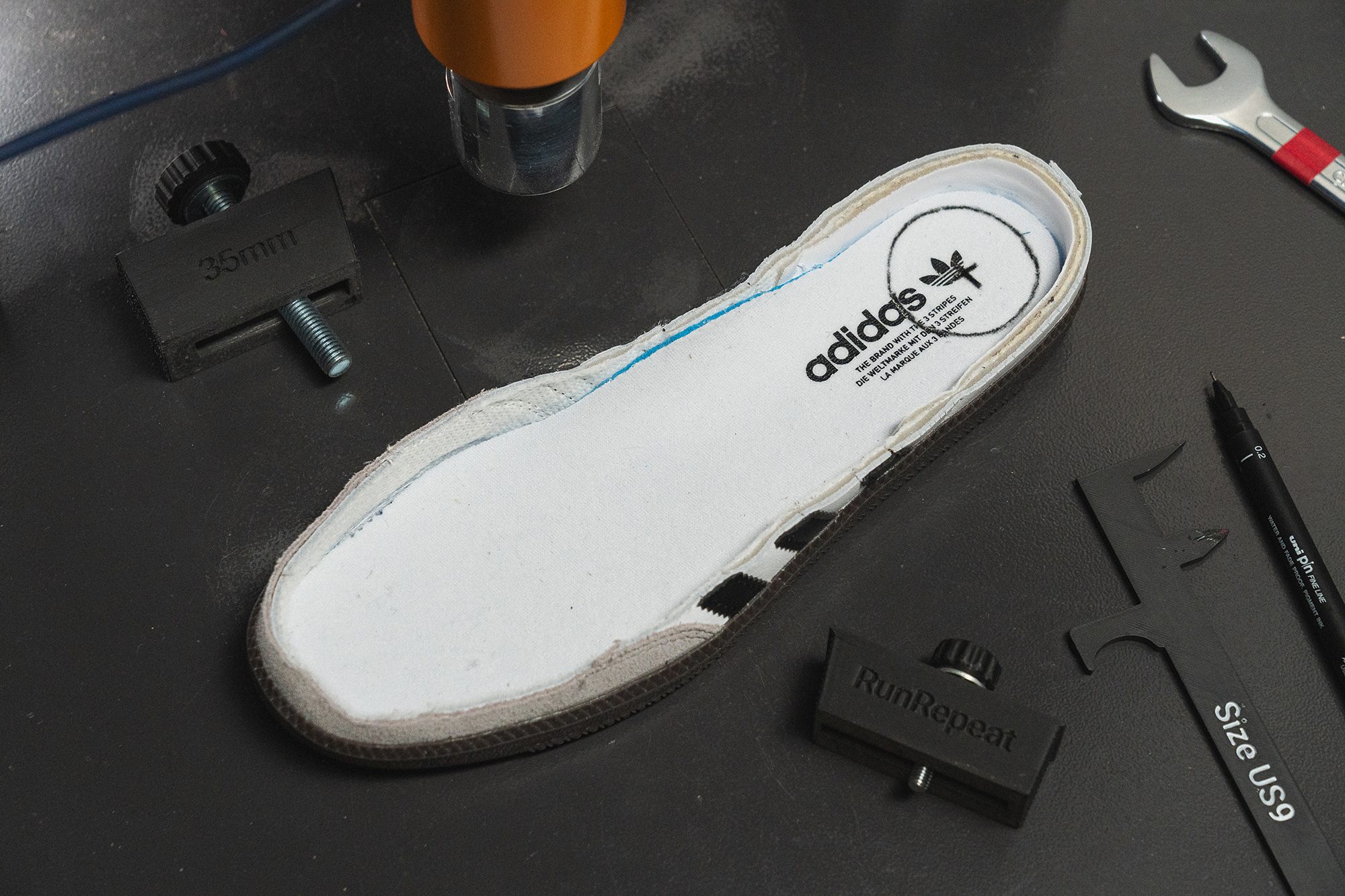
Stiff heel counters in sneakers for overpronation
Heel counter is a part of the sneaker that hugs the heel from behind. We assess its stiffness on a 1-5 scale by pushing it and squeezing it. 1/5 is saved for the softest heel counters that are very pliable, while we use 5/5 for the stiffest heel counters.
This heel counter scored 1/5 on our test, given how easy it was to press it and squeeze it
Very stiff heel counter (scored 5/5 on our test)
If you’re an overpronator, you will most likely enjoy a sneaker with a stiff heel counter. This stiffness is felt immediately upon the step-in and it feels good because these heel counters are very padded! They are comfortable and their job is to lock your feet in place. They do that job wonderfully.
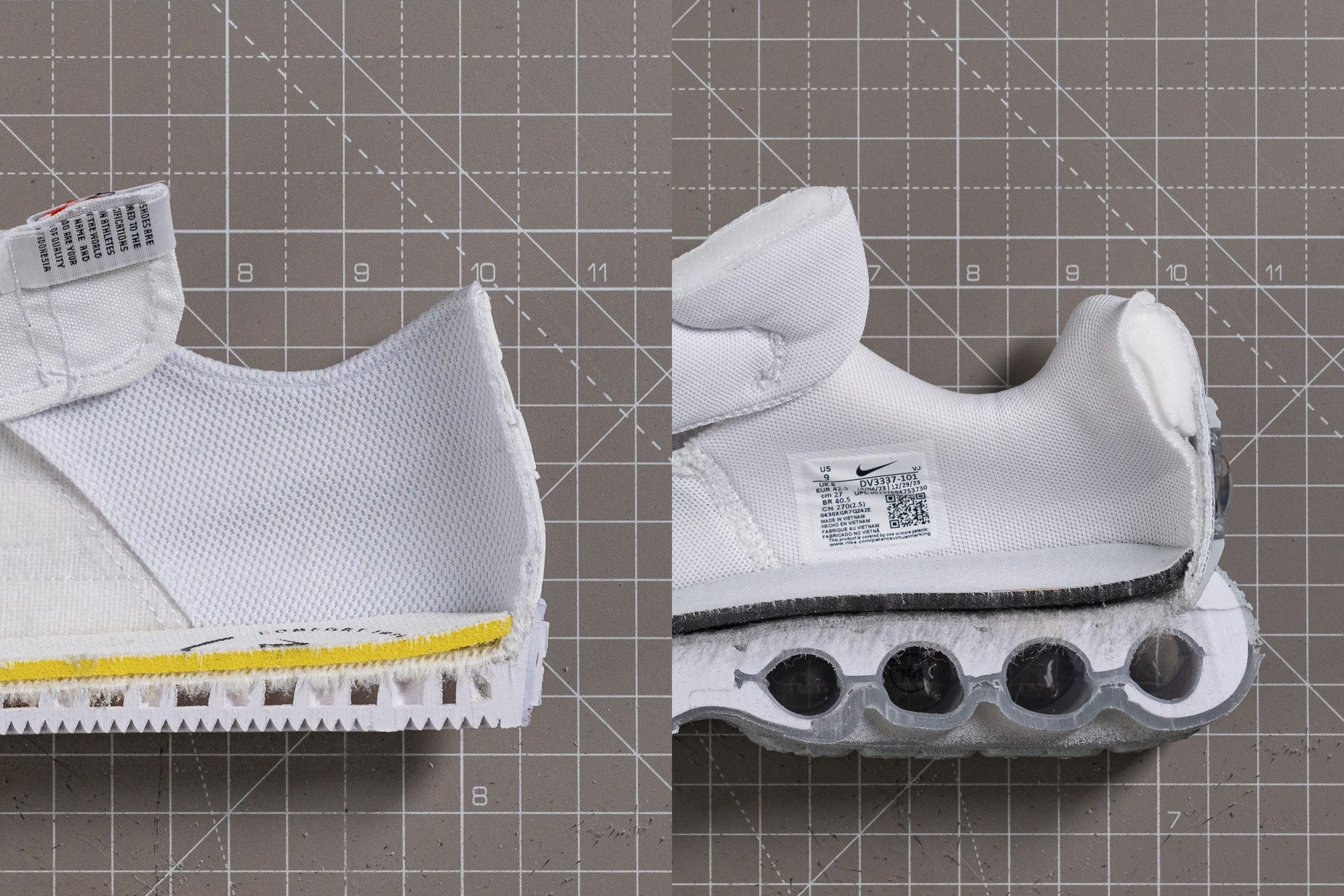
The trouble with these heel counters is that the stiffness does not allow them to mold to your heel, so if it does not feel right the moment you try the sneaker on, as in, if it’s digging into your heel, you should look for a different sneaker.
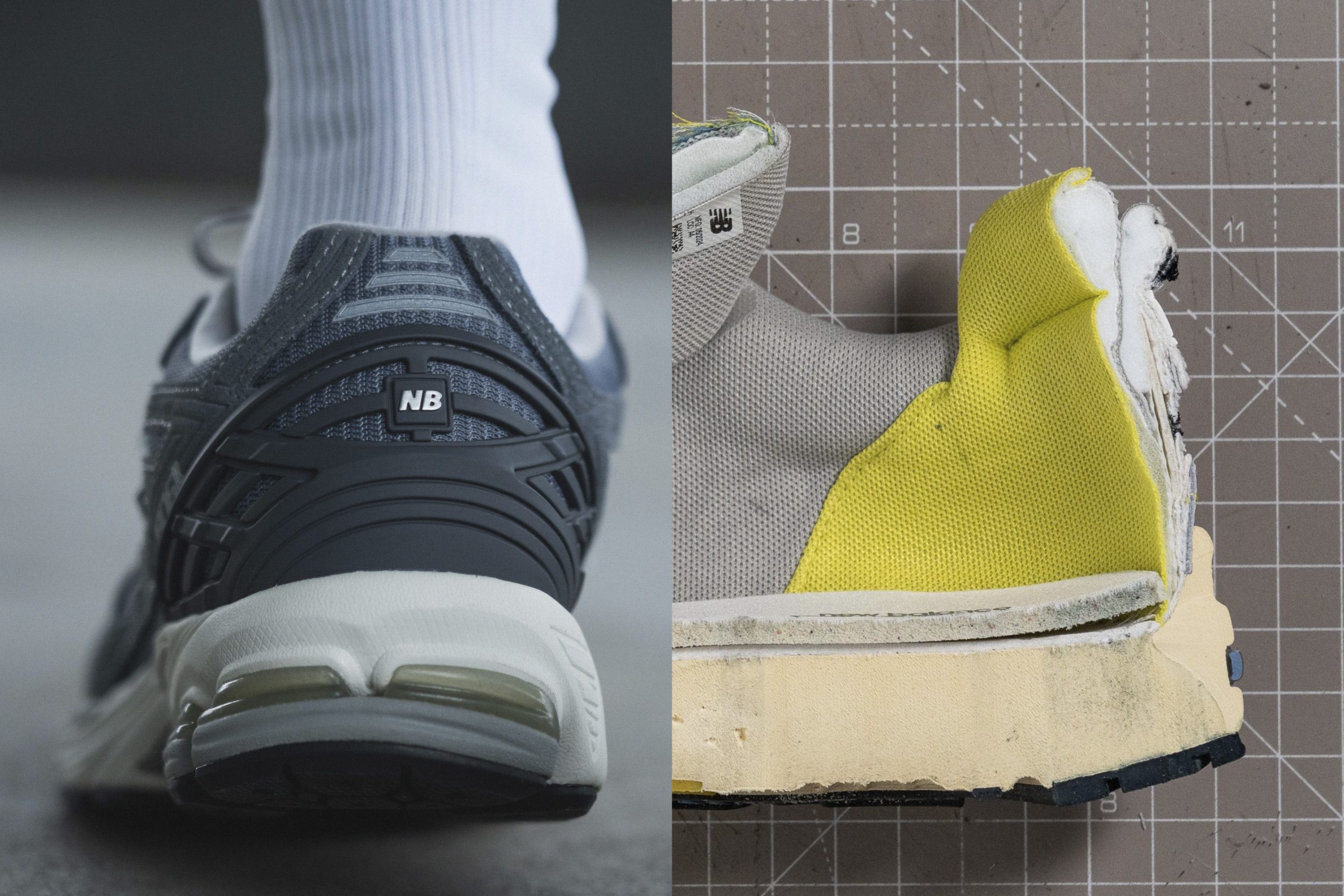
Flimsy uppers offer NO support
When an upper is soft, it can be very comfortable because it easily molds to our feet. Also it means it’s thin, so it may be very breathable. However, such uppers bring no support to the table.
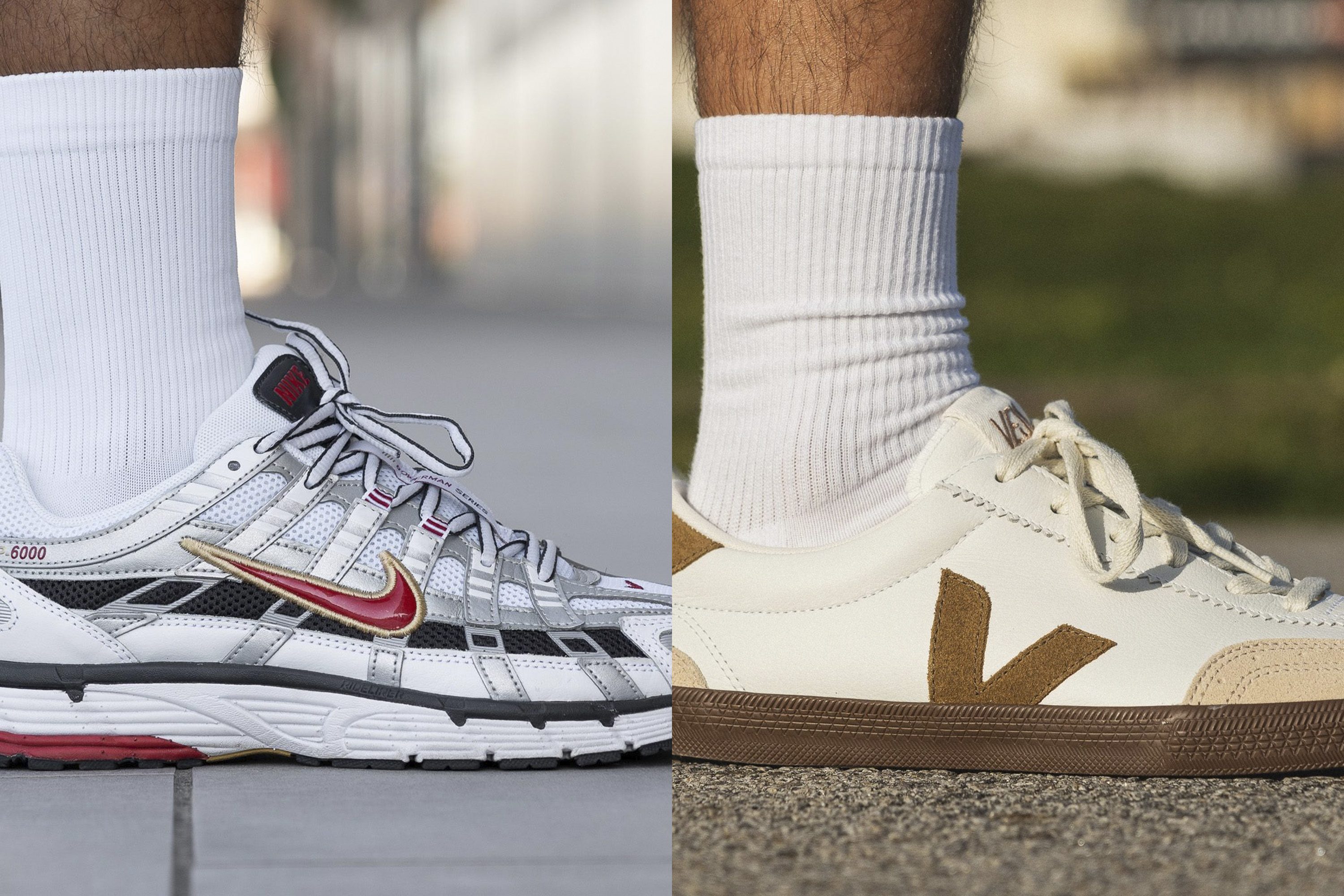
Unlike them, we have structured uppers. They are usually thicker (the sides are padded) and they have different (plastic, leather, suede) overlays that make them stiffer. These uppers improve the overall lockdown and prevent the feet from wobbling to the sides. This is exactly what we want when overpronating!
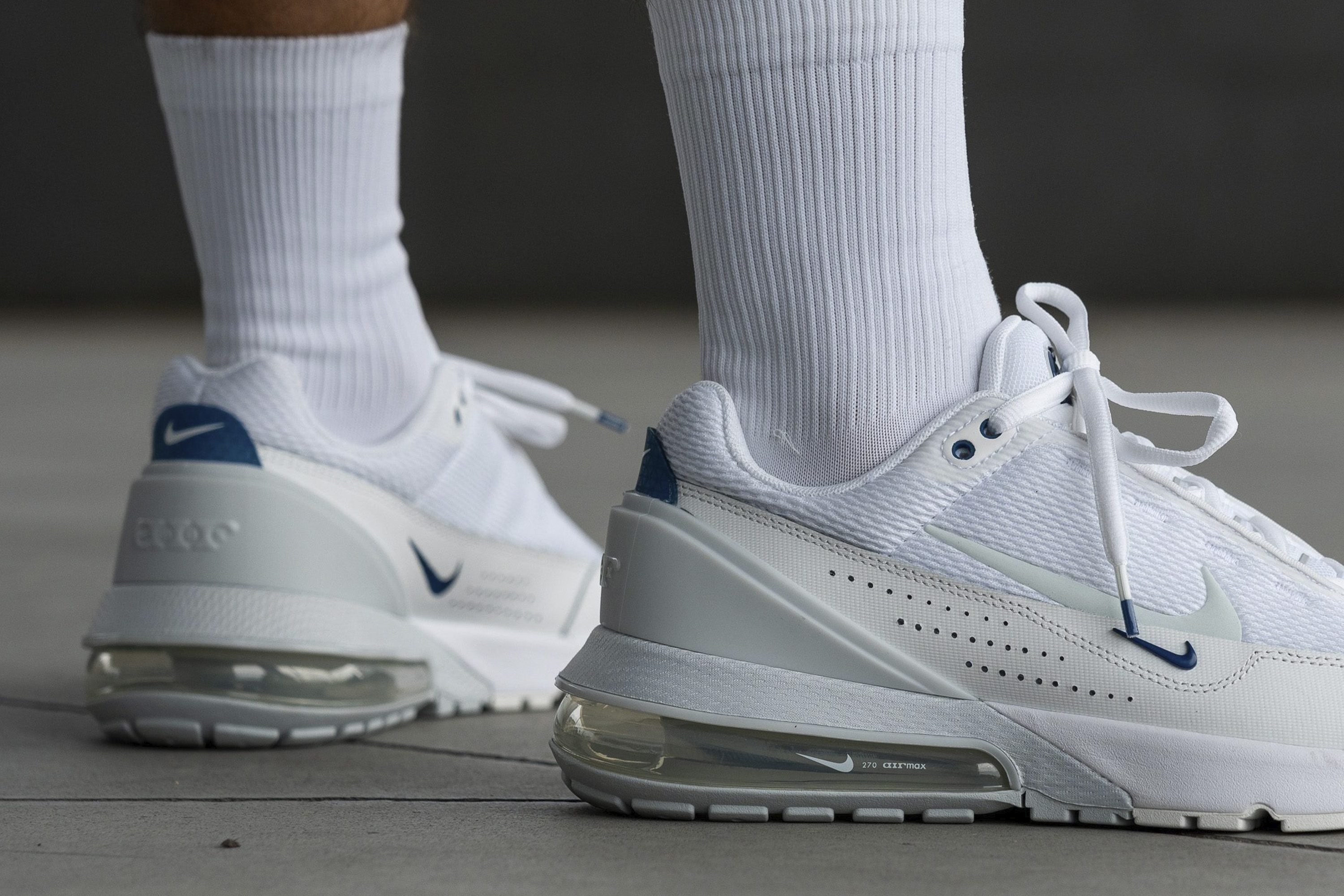
Sneaker above features an external heel counter and almost all-around upper overlay that makes a significant difference when it comes to the structure of the upper.
Sidewalls in sneakers for overpronation
Even when the upper is somewhat stiff, having extra support can’t hurt. This extra support can come from the sidewalls. Sidewalls are exactly what they sound like: walls that climb up the upper from the midsole. They are usually made of hard materials like plastic, or they can actually be the extensions of the midsole.
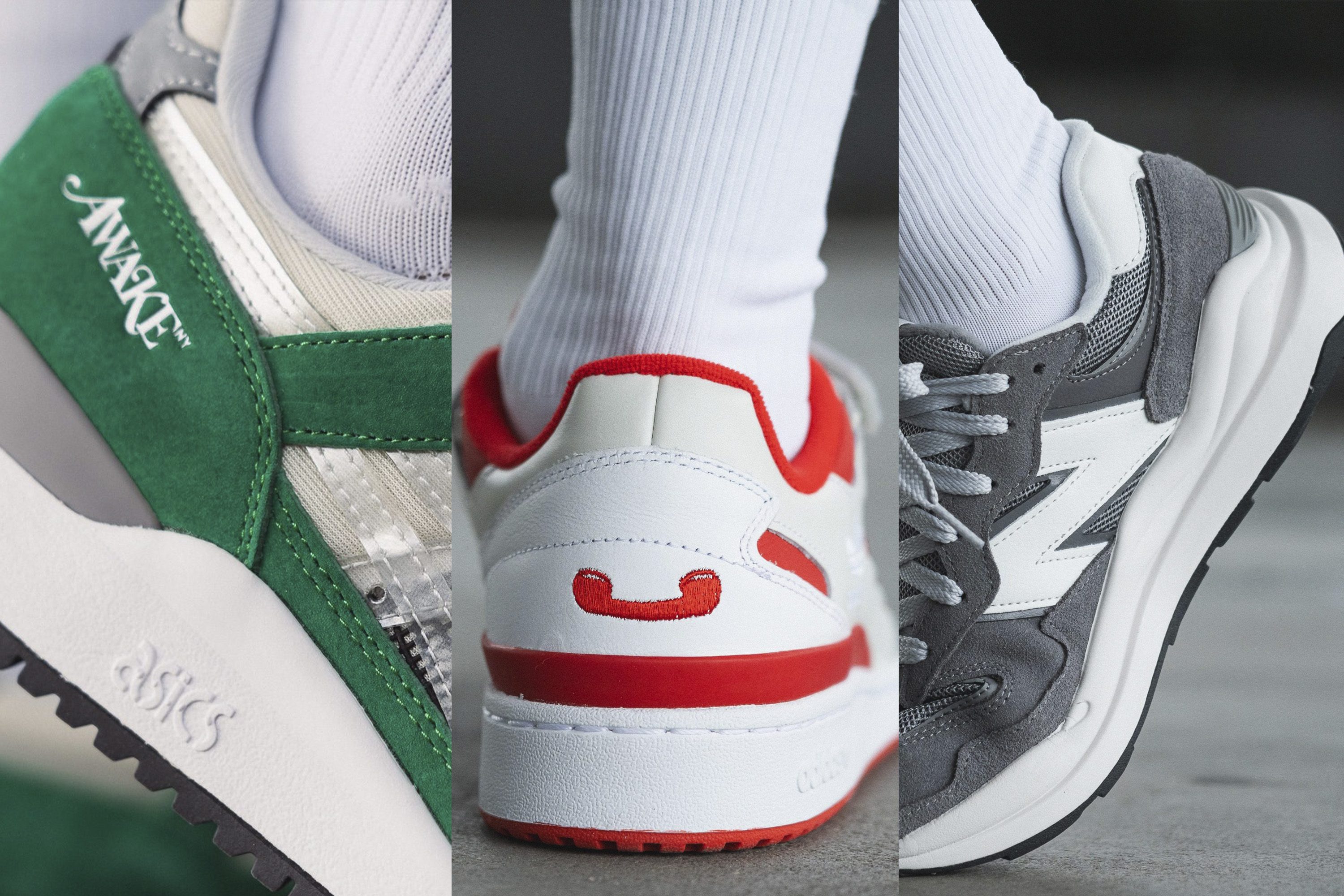
Although they are not tall, their presence is felt when we test lateral stability.
How expensive are sneakers for overpronation?
Because they are packed with different stabilizing technologies, these sneakers may be more expensive than ones made for neutral pronation or underpronation.
Looking at our database, we see that the average MSRP of sneakers for overpronation is $130, while the neutral sneakers average at $113. This makes sneakers for overpronation $17 more expensive.
Keep in mind that these prices are manufacturer’s suggested retail prices, or, how much they cost once they are released. Thanks to our price history, price alerts, and filters for discounts, you can always look for a discounted sneaker!
